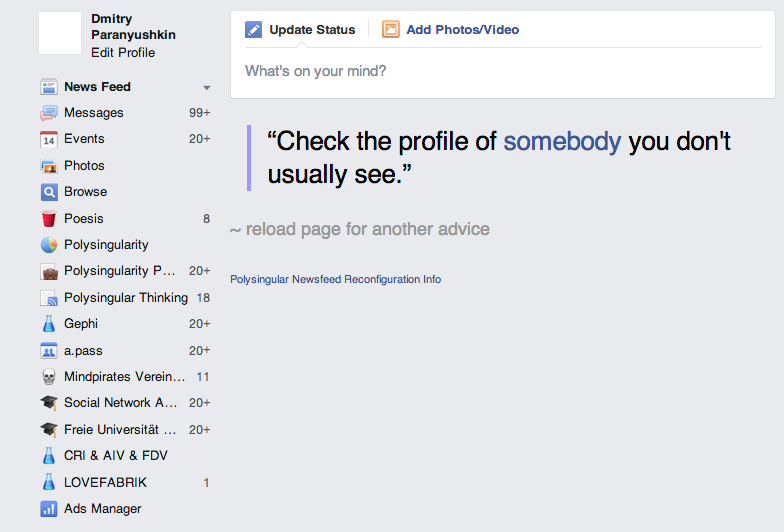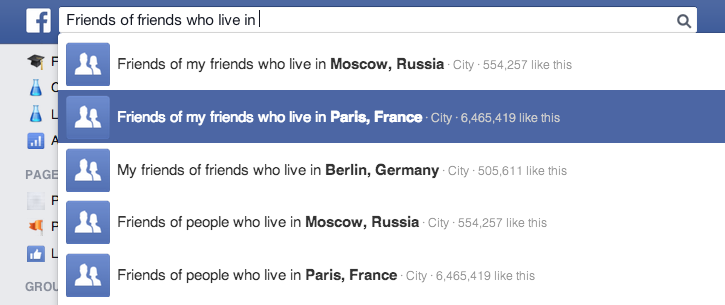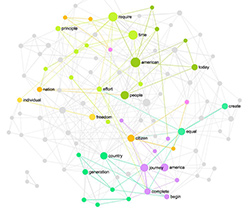Posted by Nodus Labs | April 13, 2014
Clean Facebook Newsfeed, Explode Filter Bubble
Facebook newsfeed is a huge distraction for users, producing unnecessary time waste and a false sense of social engagement. Here we present an app that eradicates Facebook newsfeed and replaces it with some interesting info, advice, and links to the more interesting Facebook features (such as Graph search).
Objective: Create a tool that will change the way people use Facebook, and lock users out of Facebook’s Filter Bubble.
Result: Clean Facebook Newsfeed Chrome extension app (Download!)
(also available as an open-source repository if you want to create your own version).

Download Clean Facebook Newsfeed Filter Bubble Eradicator Now
Facebook: The Good and the Bad Parts
Facebook locks its users into a filter bubble [1]. In order to better serve ads it shows the info that gets the most likes from the users’ friends, making it harder for them to discover new, unexpected stuff.
The Facebook newsfeed, in this case, becomes the main source of distraction and time wasting, because it just feeds the users with what they already know. It may be engaging, but it does not really make one develop in any way. At the same time, there are many positive sides to Facebook and interesting features that are a bit hidden from users.
In order to leave only the good parts in Facebook, we used the existing Facebook newsfeed eradicator app, and changed the instructions contained within. Our intention was not only to block out the newsfeed, but also to offer alternatives.
The main strategy is to divert users’ attention from Facebook newsfeed to:
a) Self-awareness (showing the interesting facts about Facebook and human behavior from scientific research);
b) Hidden interesting Facebook features (like Graph Search) that can expand users’ social circle and help them discover new stuff;
c) Physical and cognitive exercises designed to shift users’ attention and physicality and remove tension;

Step 1: Stopping Addictive Behavior through Self-Awareness
Many studies have shown that using Facebook is often attributed to deterioration in mood, time-wasting, frustration [2][3]. Sagioglou and Greitemeyer [2] have found that people also tend to make a forecasting error, expecting that using Facebook will make them feel better, when, in fact, it makes them feel worse.
The reason is that Facebook carries the promise of fulfilling the human need for social connection. Another, more subtle promise, is to increase the sense of self-worth and self-integrity [4].
Making users aware of their own behavior may diminish the intensity of those self-reinfoced feedback loops seeking attention and self-affirmation.
Step 2: Redirecting Attention Outside of the Filter Bubble
Once the user is more aware of their own behavior on Facebook, it also makes sense to change it. Refusing to use Facebook is not an option: it has too many useful features and, after all, it’s not the tool that is evil, it’s the way that people tend to use it.
One of the main problems of newsfeed, and Facebook in general, is the formation of Filter Bubble: users only see the information that relates to their social circle. However, there is an interesting feature on Facebook called Graph Search, which enables one to use the power of networks to explore users and interests outside of one’s immediate circle. Our app provides several instructions with links to various graph search features users can use to discover the new and interesting stuff on Facebook they would not have otherwise found. Also, the idea here is to change the way people use Facebook, so that eventually they change their browsing behavior without using the actual app.
So-called “creative leaps” or the moments of discoveries [5] happen with a sudden change of context, and many of the quotes and instructions provided in our app encourage this “explorative” behavior. Some of the links in the quotes that we use to replace Facebook newsfeed with refer users to most recent tweets on creativity, link to the interesting articles and videos that will encourage a more open-minded and creative approach to one’s interactions with information. The app is regularly updated, to ensure this material always stays fresh.
Another aspect of filter bubble is more in the physical realm. Users are often glued to their monitors in fixed positions for prolonged periods of times, creating tension inside the body. A set of instructions contained in the app reminds users to change their focus, stretch, make a short break, go for a walk, and basically be a bit more mobile than we usually are when sitting in front of a computer.
Creating Your Own Version
You can create your own version of this app, adding your own quotes, recommendations, and links to the newsfeed.
The easy way is to send us the quotes that you want to have, and we’ll send you back your own version of this extension, which you can then install easily into your Chrome browser.
The harder, but more flexible way, is to fork open-source repository for this app. After you fork it, go to eradicate.js file in the root folder right in your GitHub, click “Edit”, and edit the quotes as you wish. Finally, once you’re done, download the Zip archive of the modified app to your computer, UnZip the folder, then go to your Chrome browser Extensions settings, turn on “Developer Mode” (checkbox at the top right) and then click “Load unpacked extension” button at the top. The new extension with your own quotes will be installed. It’s that easy!
References
[1] Pariser, E. read about Filter Bubble on Wikipedia.
[2] Sagioglu, C & Greitemeyer, T (2014). Facebook’s emotional consequences: Why Facebook causes a decrease in mood and why people still use it. Computers in Human Behavior, Volume 35
[3] Kross et al (2013). Facebook Use Predicts Declines in Subjective Well-Being in Young Adults
, PLOS One
[4] Toma, C & Hancock, J (2013). Self-Affirmation Underlies Facebook Use. Personality and Social Psychology Bulletin.
[5] Noy et al (2012) “A Quantitive Study of Creative Leaps“, Weizmann Institute, Israel
This app is based on Jord West’s News Feed Eradicator.

